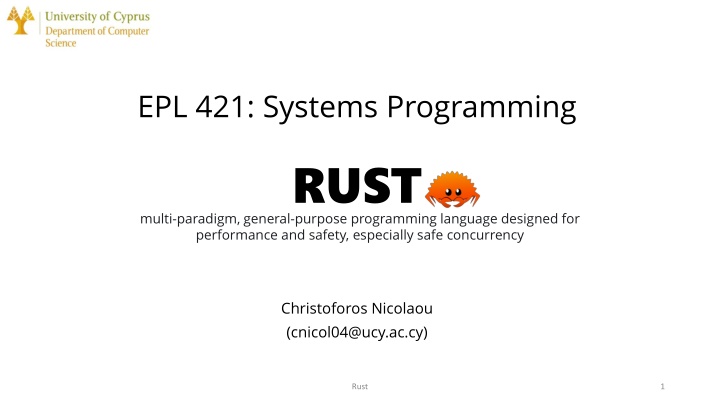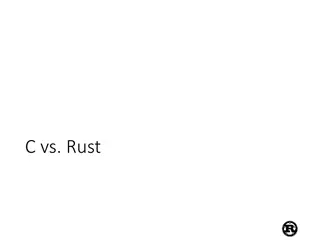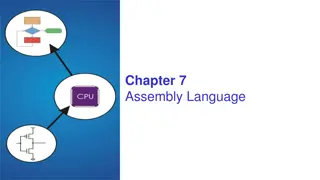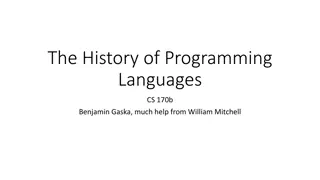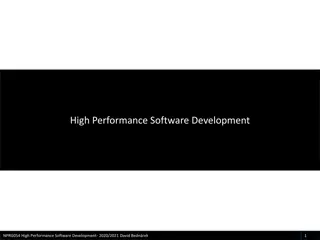Rust: Systems Programming Language Designed for Performance and Safety
Rust is a multi-paradigm, general-purpose programming language known for its safe concurrency and performance. It offers features like pattern matching, closures, iterators, and a unique ownership model. Rust is widely used in game engines, CLI programs, backend services, and embedded systems, including the Linux kernel. The language emphasizes high-level simplicity and low-level performance, with tools like Cargo and Rust Analyzer supporting the community. Rust's ownership and borrowing system ensures memory safety and prevents common pitfalls like null pointer dereferencing and use-after-free errors. The language's syntax and tools contribute to its performance, making it a compelling choice for low-level programming tasks. Rust can be easily installed on Windows and Unix systems, and projects are managed through tools like Cargo. Its memory management methods set it apart from languages like Python, Java, and C, making it a powerful option for developers focusing on memory safety and efficiency.
Uploaded on Feb 16, 2025 | 4 Views
Download Presentation

Please find below an Image/Link to download the presentation.
The content on the website is provided AS IS for your information and personal use only. It may not be sold, licensed, or shared on other websites without obtaining consent from the author.If you encounter any issues during the download, it is possible that the publisher has removed the file from their server.
You are allowed to download the files provided on this website for personal or commercial use, subject to the condition that they are used lawfully. All files are the property of their respective owners.
The content on the website is provided AS IS for your information and personal use only. It may not be sold, licensed, or shared on other websites without obtaining consent from the author.
E N D
Presentation Transcript
EPL 421: Systems Programming RUST multi-paradigm, general-purpose programming language designed for performance and safety, especially safe concurrency Christoforos Nicolaou (cnicol04@ucy.ac.cy) Rust 1
Rust? Graydon Hoare 2006 Mozilla 2010 rust fungus Ferris Compiled Rust 2
? , game engines, : CLI programs, backend services, embedded programs Linux kernel! Rust 3
Rust? Multi-paradigm pattern matching, closures, iterators, traits, etc. High level simplicity / Low level performance type system ownership model (tools) Cargo, Rust Analyzer, etc. community Rust 4
Rust VS C RUST C Ownership & Borrowing system NULL pointer dereferencing, use- after-free, etc. SAFETY CONCURRENCY Built-in support pattern matching, iterators, closures, etc. SYNTAX TOOLS manually PERFORMANCE Rust 5
low level programming Garbage Collector Rust (Java, C++) / Rust 6
Rust Windows: rustup-init.exe Rust: https://www.rust-lang.org/tools/install Unix: rustup-init.sh : Rust 7
Project & Cargo: Project ( hello_cargo): M : Rust 8
, ( . . Python, Java, Go) Garbage Collector ( . . C) free malloc Rust: - Garbage Collector - Ownership & Borrowing Model memory safety - ownership ! Let s Get Rusty s explanation of memory management methods in different programming languages 9
Ownership & Borrowing Rust Ownership Rules: 1) Each value has a variable that s called its owner 2) There can only be one owner at a time 3) When the owner goes out of scope, the value will be dropped borrowing OK O compiler compile Rust 10
Referencing O compiler compile Rust Referencing Rules: 1) Only 1 mutable reference per variable => prevents data races!!! 2) No mutable reference allowed if an immutable reference already exists However, multiple immutable references are allowed 3) References must always be valid (no dangling allowed) Rust 11
fork() cmd Windows use std::process::{Command, Stdio}; use std::env; fn main() { let args: Vec<String> = env::args().collect(); program arguments if args.len() < 2 { println!("Usage: {} command", args[0]); return; } process spawned cmd /C option cmd, argument let new_process = Command::new("cmd") .args(&["/C", &args[1]]) .stdin(Stdio::piped()) .stdout(Stdio::piped()) .stderr(Stdio::piped()) .spawn() .expect("Unable to spawn process."); process stdin, stdout, stderr pipe let output = new_process.wait_with_output().expect("Unable to wait for child."); println!("Hello from parent!"); println!("Child exit status: {}", output.status); println!("Child process stdout: {}", String::from_utf8_lossy(&output.stdout)); println!("Child process stderr: {}", String::from_utf8_lossy(&output.stderr)); } Rust 12
HTTP Server use std::{ env, fs, io::{prelude::*, BufReader}, net::{TcpListener, TcpStream}, thread, sync::{ mpsc, Arc, Mutex }, }; fn main() { let args: Vec<String> = env::args().collect(); program arguments let server_address: &str = "127.0.0.1"; let server_port: u16 = 30_000; let num_workers: usize = if args.len() < 2 { 40 // Default } else { args[1].parse().unwrap() }; // Create Multi-producer, Single-consumer queue (channel) let (job_sender, job_receiver) = mpsc::channel(); server mpsc: Multiple-Producer, Single-Consumer channel Arc: Atomically Reference Counted Mutex: Mutex Lock // Wrap receiver in mutex let job_receiver = Arc::new(Mutex::new(job_receiver)); // Create and run workers let mut workers = Vec::with_capacity(num_workers); for i in 0..num_workers { workers.push(Worker::new(i, Arc::clone(&job_receiver))); } workers (threads) Rust 14
HTTP Server println!("Starting web server with {} workers.", num_workers); // Bind server address and port let listener = TcpListener::bind(format!("{}:{}", server_address, server_port)).unwrap(); // Listen for incoming requests for stream in listener.incoming() { let stream = stream.unwrap(); Bind server address & port socket // Create job to handle request let job = Box::new(|| { handle_connection(stream); }); job // Send job to channel (queue) job_sender.send(job).unwrap(); } } (job) mpsc channel scope drop connection Rust 15
HTTP Server // Handles TCP connection fn handle_connection(mut stream: TcpStream) { let buf_reader = BufReader::new(&mut stream); BufReader: request (.next()) // Get first line of request let request_line = buf_reader.lines().next().unwrap().unwrap(); // Get status line let (status_line, filename) = match &request_line[..] { "GET / HTTP/1.1" => ("HTTP/1.1 200 OK", "index.html"), _ => ("HTTP/1.1 404 Not Found", "404.html"), }; match: pattern matching request status // Load contents of requested file let contents = fs::read_to_string(filename).unwrap(); let length = contents.len(); // Form response string (similar to sprintf) let response = format!("{status_line}\r\nContent-Length: {length}\r\n\r\n{contents}"); // Send response stream.write_all(response.as_bytes()).unwrap(); } response string format! macro bytes response socket Rust 16
HTTP Server // Job type - the code that the worker executes type Job = Box<dyn FnOnce() + Send + 'static>; Job closure Box: Wrapper class heap // Thread worker struct struct Worker { id: usize, thread: thread::JoinHandle<()>, } JoinHandle<()> - thread Arc: Atomically Reference Counted Mutex: Mutex Lock mpsc: Multiple-Producer, Single-Consumer channel impl Worker { // Create a new worker fn new(id: usize, receiver: Arc<Mutex<mpsc::Receiver<Job>>>) -> Worker { // Spawn a thread that executes jobs received at the queue let thread = thread::spawn(move || loop { // Get next job from channel (queue) let job = receiver.lock().unwrap().recv().unwrap(); println!("Worker {id} is executing a job."); move: ownership closure loop: Infinite loop closure mutex // Execute the job job(); }); worker main return Worker { id, thread }; } } Rust 17
: , (Workers) C , casting, string formatting, pattern matching . documentation : ownership model Rust concurrency (arc, mutex, mpsc) Rust 19
Rust documentation , (Cargo, Rust analyzer) features : - Slice types - Pattern matching - Closures - Object oriented features like Templates - Rust 20
[1] The Rust Programming Language Book, https://doc.rust-lang.org/book/ [2] Rust Official Website, https://www.rust-lang.org/ [3] Rust (programming language), Wikipedia, https://en.wikipedia.org/wiki/Rust_(programming_language) [4] Home of Ferris the Crab, https://rustacean.net/ [5] Speed of Rust vs C, https://kornel.ski/rust-c-speed [6]Let s Get Rusty, https://www.youtube.com/@letsgetrusty [7] Rust Tutorial Full Course, https://www.youtube.com/watch?v=ygL_xcavzQ4&ab_channel=DerekBanas Rust 21
